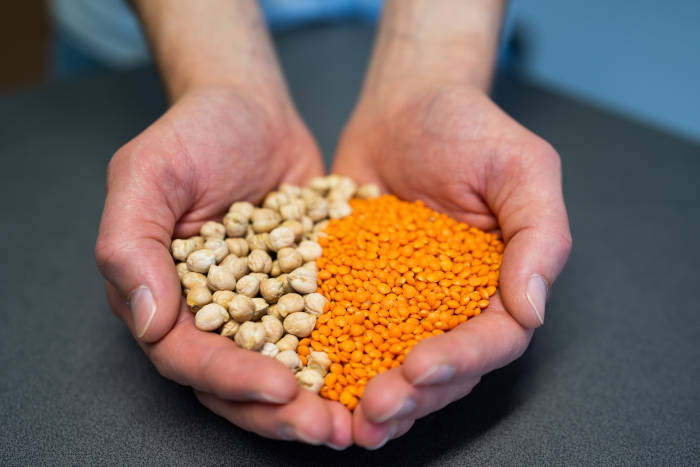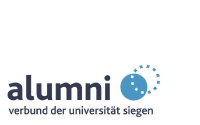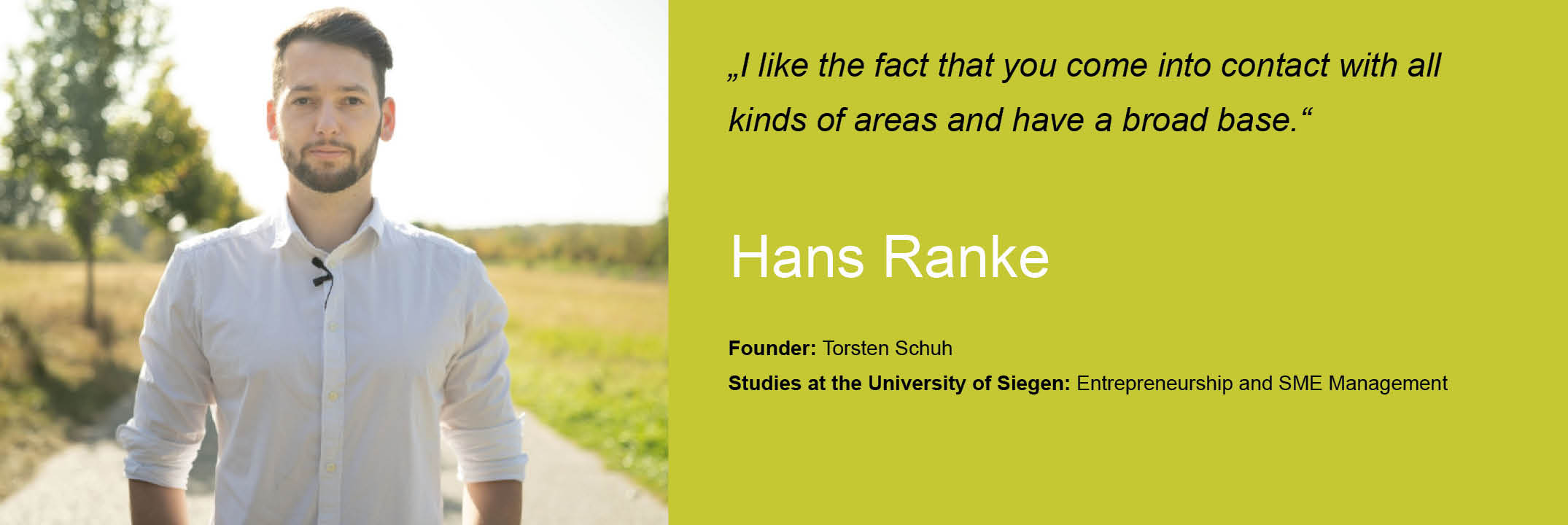Hans Ranke
Pulses, such as chickpeas, red lentils and peas, are the new superfood of today. The start-up Hans Ranke focuses on healthy new ready meals consisting of couscous (made from chickpeas and red lentils), dried vegetables and organic spices.
Founder Torsten Schuh discovered the potential of this filling food in the summer of 2018. When his friend at the time, Simon, started eating a vegetarian diet, he stumbled across couscous pasta by chance. From then on, the student on the Master's degree programme in Entrepreneurship and SME Management pursued the topic with increasing interest and the idea of founding his own start-up to produce vegan food based on pulses was quickly born. Today, the Hans Ranke brand offers vegan and gluten-free products that are as delicious as they are easy to prepare.
Incidentally, the company name Hans Ranke is derived from the fairy tale Hans and the Beanstalk. Torsten Schuh found it very fitting, as the fairy tale picks up on the theme of the bean on the one hand, and on the other, he says, he modelled it on growing like the tendril from the enchanted beans and thus ‘advancing into the realm of the giants’.

How did you come up with the idea of Hans Ranke and the associated idea of producing food from pulses?
I have always been very interested in start-ups and was looking for an exciting idea during my studies. The topic of pulses came up when Simon started eating a vegetarian diet. Although pasta made from lentils and the like is already available in the supermarket, it is not of such high quality and not particularly sustainable. However, the trend in our society is towards eating a healthier, more sustainable and meat-free diet. I therefore recognised the potential of this alternative. What's more, our products are very easy to prepare - without much effort or conversion.
What attracted you to setting up your own company?
I've never liked the structures that prevail in many companies - for example, you should be paid according to performance and not according to the time you spend at work. Now, in my own company, I'm living that. I can also structure my work completely freely. I work when, how and where I want. I'm also driven by the goal of bringing healthy and quick-to-prepare dishes to the market. I try to eat healthily, but there are no quick alternatives. And last but not least, of course, there's also self-realisation.
When did you decide to set up your own company?
The basic idea for food made from pulses came about in 2018. As I delved deeper into the topic, I quickly realised that it was relatively difficult to find producers for the products online. In February 2019, I therefore visited a trade fair to find producers and get more inspiration. However, this trade fair was only open to trade visitors, so I drew up a 40-page business plan within a week and officially founded the company a short time later. When I was awarded the Gründerstipedium NRW, it gave the idea even more impetus.
What was the biggest challenge you faced at Hans Ranke?
The most difficult thing is to know where to start. Then, right at the beginning, there was the problem of finding a manufacturer for couscous made from red lentils or chickpeas. In addition, setting up the company was a big difference to studying. Self-organisation plays an even greater role than in university, because there are no deadlines and dates set by external parties, as is the case with an exam, for example. Particularly in the planning phase, you have to set yourself goals and deadlines completely independently.

To what extent did the university's start-up office support you?
On the one hand, the start-up office gives me a place to work and an office for important appointments. On the other hand, the network was and is incredibly helpful. The transfer of knowledge and the mutual exchange with both the employees of the start-up office and the other founders is very beneficial. You are also made aware of many competitions, trade fairs and lectures.
What is your advice for young founders?
That's a good question. I would probably advise you to just go for it. I know so many people who once had ideas but didn't follow them up. You don't necessarily have to write a detailed business plan like I did, but simply work intensively on your idea and then you'll automatically be more motivated. Don't let criticism demotivate you, but also don't be too dogged and try to realise your idea by hook or by crook. In any case, you should do something that you really believe in, otherwise you will lose motivation at some point and the whole thing is doomed to failure. You should also not be afraid to present your idea to others and thus make important contacts.
Would you found a company again?
Yes, I would definitely start up again. I have learnt so much and built up such a large network. I like the fact that you come into contact with all kinds of areas and have a broad base. So I can only take positive things from my start-up.
This portrait is based on an interview with Torsten Schuh in May 2020 and was written by Janice Gust.
Click here for the startup's homepage.


